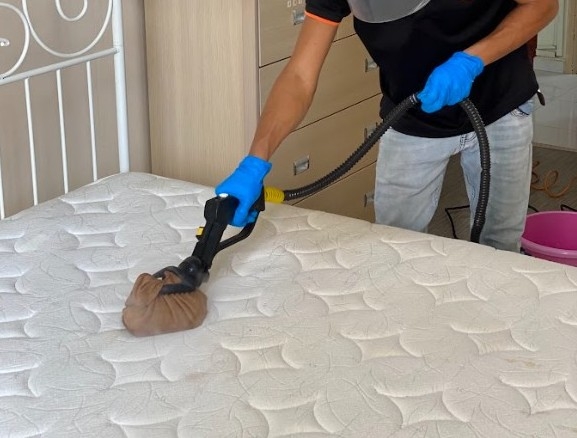A mattress might appear clean, but over time, it collects more than just dust. Sweat, oils, bacteria, dead skin cells, and moisture all get trapped deep within its layers. It is especially true if the mattress hasn’t been cleaned for over six months or if someone in the household has recently recovered from an illness. As mattresses absorb more than just dust over time, things like sweat, body oils, and general moisture can lead to persistent odours. A quick vacuum or airing out may offer temporary relief, but deeper issues often need more focused care.
In this blog, we break down nine practical and proven cleaning methods to help eliminate tough odours and restore your mattress to a fresh, healthy state. Whether you’re tackling sweat, body odours, pet accidents, or illness-related contamination, these methods offer real results.
Why Mattresses Start to Smell
Mattresses are porous by design. They’re meant to support and cushion, but that also means they absorb just about everything that comes into contact with them. The most common source of mattress odour is perspiration. Each night, your body releases sweat, which seeps into the layers of your mattress. Over time, this moisture can create a damp environment that promotes bacterial growth.
Additionally, your skin sheds natural oils and cells that accumulate inside the mattress. These, in turn, provide food for dust mites and facilitate the spread of bacteria. Accidental spills, such as drinks, urine, or vomit, are also a common source of unpleasant smells. If not cleaned promptly, these fluids can soak in and cause persistent odours that are difficult to remove. If these aren’t cleaned properly, the fluids soak in and remain, leaving behind strong, unpleasant odours. When not cleaned properly, these fluids soak into the mattress and linger, causing persistent smells.
In some cases, odours are linked to illness. High fevers, vomiting, or prolonged bed rest can all result in bodily fluids contaminating the mattress. These situations introduce bacteria that continue to thrive until fully removed.
When to Deep Clean Your Mattress?
Deep cleaning a mattress isn’t something you need to do weekly, but there are clear signs that indicate when it’s necessary. If you catch a sour or stale smell while changing your sheets, it’s usually a good sign your mattress needs some attention. If it’s been more than six months since your mattress was last cleaned, it’s probably overdue. Giving it a proper clean now not only helps eliminate built-up grime and odours but also supports a healthier and more comfortable place to sleep.
If someone in your household has recently been unwell, it’s especially important to deep clean the mattress they used. Sweat and illness-related fluids may remain in the fibres, potentially carrying bacteria and increasing the risk of reinfection or spreading germs to others.
Deep cleaning is also essential if you’ve recently moved into a new place with an old mattress or if pets regularly sleep on the bed. In these cases, starting fresh is always the better option.
If you’re asking yourself how often you should deep clean a mattress, the answer depends on usage and exposure. As a general rule, deep clean at least every six months. For households with allergies, young children, pets, or anyone recovering from illness, more frequent cleaning may be necessary.
What You’ll Need for Proper Mattress Deep Cleaning
To achieve the best results, start by gathering the necessary tools and products for the job.
- Vacuum cleaner with a HEPA filter: Essential for capturing fine dust and allergens that can accumulate in your mattress over time.
- Baking soda: A natural deodoriser that helps neutralise odours.
- Enzyme cleaner: Effective against sweat, urine, or vomit-based odours.
- Steam cleaner: Works well if used correctly, but isn’t suitable for all mattress types.
- Hydrogen peroxide: Useful for spot treatments and removing stains.
- White vinegar: A natural disinfectant that helps lift bacteria and refresh mattress fabric without harsh chemicals.
- Essential oils (such as lavender or tea tree): Add a light scent, but use them sparingly and safely.
Before you begin, ensure you have the necessary tools and products. A vacuum cleaner with a HEPA filter is essential for removing fine dust and allergens (source). Baking soda is a natural deodoriser that helps neutralise odours. You’ll also want an enzyme cleaner, especially if the odours are from sweat, urine, or vomit. Steam cleaners can work well when used properly, but they may not be a good fit for every mattress. If you’re treating specific stains, hydrogen peroxide can be effective in lifting marks. White vinegar is a natural disinfectant and works well on general bacteria and light odours. If you want to add a light scent, just a drop or two of essential oil, such as lavender or tea tree, can do the trick. Always use them with care, especially if there are kids or pets in the home.
1. Baking Soda Overnight Treatment
Baking soda is one of the most effective and accessible products for eliminating mattress odours. First, remove all the bedding and thoroughly vacuum the surface to clear away dust and loose debris. After that, sprinkle a generous amount of baking soda evenly across the top.
You’ll want to leave it there for at least eight hours. If the smell’s strong, letting it sit overnight works better. While it’s on the mattress, the baking soda pulls out moisture and helps tackle whatever’s causing the odour. Once that’s done, vacuum up all the debris. It’s a simple step, but it goes a long way in freshening things up, especially before using any stronger cleaning methods.
2. Steam Cleaning with High Heat
Steam cleaning can sanitise a mattress by killing bacteria, dust mites, and mould spores. If you’re using a steam cleaner, ensure it’s equipped with a mattress-safe attachment and can reach a temperature of at least 120°C. Gently run your hands over the surface to allow the heat to penetrate the fabric. This approach works well for spring or hybrid mattresses, where the internal structure can handle moisture and high temperatures.
Memory foam and latex are different. They tend to hold onto moisture, which can lead to mould if not dried properly, so it’s best to avoid steam with those types. If you’re unsure whether your mattress can withstand steam, it’s best to check the care label or the manufacturer’s website for guidance. After cleaning, ensure it dries completely. Leave it in a well-ventilated room or set up a fan nearby. Allowing it to dry properly helps prevent moisture from turning into mould or other issues later on.
3. Enzyme-Based Odour Remover
Enzyme cleaners are specifically designed to break down organic matter and are particularly effective for removing odours caused by urine, vomit, or sweat. Lightly spray the affected area according to the product’s directions and allow the solution to sit for the recommended time. After that, blot with a clean cloth to absorb any remaining moisture.
Unlike products that only mask odours, enzyme cleaners break down the actual cause of the odours. They’re particularly effective after someone has spent several days on a bed due to illness, as they help remove the buildup of sweat and other organic matter from the mattress.
4. White Vinegar and Sun-Dry Method
White vinegar is a natural disinfectant that’s safe for most mattress fabrics. Mix it with an equal amount of water and pour the solution into a spray bottle. Spray the mattress lightly, focusing on areas where the smell is strongest, but be cautious not to overdo it. Soaking the fabric can cause problems. After spraying, move the mattress into direct sunlight for a few hours. The vinegar and sun work well together, helping to kill off bacteria and freshen the surface. This method is most effective in dry, sunny weather and is particularly useful for treating mild mould or musty odours.
5. UV Light Sanitising
Some people prefer not to use any moisture when cleaning, and UV light can be a good alternative. It’s chemical-free and helps eliminate bacteria, dust mites, and viruses. Pass the device slowly over the mattress, ensuring you cover all areas evenly.
It’s especially helpful for memory foam or any mattress that shouldn’t get damp. It won’t replace a full deep clean, but it’s useful for keeping things in check in between.
6. Hydrogen Peroxide Spot Treatment
Hydrogen peroxide can help with tough stains and lingering smells. Mix one part peroxide with two parts water, then dip a clean cloth into the solution. Dab it on the spot. Don’t pour it straight onto the mattress, since too much moisture can cause problems.
It works best for small areas, rather than the entire surface. Once you’re done, blot the spot with a dry towel and let it air out fully before putting any bedding back on.
7. HEPA Vacuum Cleaning
A vacuum with a HEPA filter removes fine dust, allergens, and baking soda residue. Start by vacuuming the mattress before applying any cleaning treatment, then again after the process is complete. Pay close attention to seams and edges where debris often collects.
Regular vacuuming extends the life of your mattress and improves overall indoor air quality.
If you’ve tried several cleaning methods and the smell persists, you may wonder if it’s time to replace your mattress. In most cases, persistent odours can be addressed with professional cleaning. However, if the mattress is old, heavily soiled, or causing ongoing health concerns, replacement might be the better option.
8. Essential Oil Deodoriser
If you’re looking to add a natural scent, essential oils can be blended with baking soda to create a unique aroma. Use only a few drops of oils, such as lavender or tea tree, which also offer antibacterial properties. Mix with baking soda and apply as described in Method 1.
This step is optional but adds a pleasant, subtle fragrance. Be sure the oils are properly diluted and mattress-safe, especially in homes with children or pets.
9. Call a Professional Mattress Cleaner
If your mattress still smells after trying several methods, it may be time to enlist the help of experts. Professional cleaning services use commercial-grade equipment that reaches deeper into the mattress layers. TotalCleanz, for example, uses eco-friendly cleaning solutions that are safe for families and pets.
Professional cleaning is especially recommended after illness, for mattresses older than five years, or when preparing a property for new tenants. It’s a reliable option that saves time and delivers consistent results.
You might be asking, Is professional mattress cleaning worth it? If deep odours persist or hygiene is a concern, professional cleaning not only solves the issue but also prolongs the life of your mattress and ensures a healthier sleeping environment.
How to Prevent Mattress Odours in the Future
Once your mattress is clean, a few habits can help maintain freshness. Use a washable mattress protector to guard against spills and sweat. Air out the mattress monthly by removing bedding and opening windows for a few hours. Rotate the mattress every few months to ensure even wear and reduce moisture buildup.
If you live in a humid area, consider using a dehumidifier in your bedroom to help reduce humidity levels. Dehumidifier helps prevent mould growth and keeps the mattress dry. Most importantly, clean up any spills immediately before they seep into the core.
Conclusion
Over time, mattresses can hold onto more than just wear and tear. If it starts to smell, there’s a good chance something like bacteria or mould is behind it. That’s not just an issue of comfort; it can also impact your health. Giving your mattress a proper clean now and then, especially after someone’s been unwell, helps keep things in check.
These nine methods give you options, whether you prefer DIY techniques or professional support. For a comprehensive overview of our specialised services, you can explore our mattress cleaning solutions, tailored to meet your specific needs. If you want guaranteed results without the hassle, TotalCleanz offers eco-friendly, professional mattress cleaning that restores freshness and peace of mind.
Smells coming from your mattress usually mean something has built up inside, such as sweat, bacteria, or even mould. You can try a few things at home, but if the smell persists, it may be time to let a professional handle it properly. At Total Cleanz, we clean mattresses deep down, not just the surface. We keep it safe, eco-friendly, and focused on giving you a fresher place to sleep.






